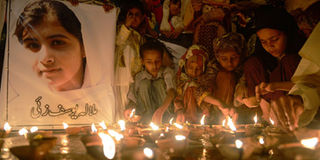Outrage in Pakistan over girl, but change unlikely

PHOTO | ASIF HASSAN Pakistani children place oil lamps next to a photograph of child activist Malala Yousafzai, who was shot in the head in a Taliban assassination attempt, as they pay tribute in Karachi on October 12, 2012. Pakistanis at mosques across the country prayed Friday for the recovery of a schoolgirl shot in the head by the Taliban as doctors said the next two days were critical.
What you need to know:
- Fourteen-year-old Malala Yousafzai remains in a critical condition in the country's top military hospital three days after she was shot, as politicians, school children, Muslims and Christians pray for her recovery
- The plight of an exceptional young girl who won international recognition for campaigning for the right to an education has sickened millions
- Activists say the shooting should be a wake-up call to whose who advocate appeasement or peace with the Taliban, but analysts say that would require a seismic shift in a country that has sponsored radical Islam for decades
Pakistan has united in revulsion over a Taliban attack on a schoolgirl, but few analysts believe anything will change in a country that has exploited Islamist extremism as an instrument of state policy.
Fourteen-year-old Malala Yousafzai remains in a critical condition in the country's top military hospital three days after she was shot, as politicians, school children, Muslims and Christians pray for her recovery.
Pakistan is largely inured to horrific acts of violence. Mosques have been attacked. Ordinary people are slaughtered by suicide bombers. There are sectarian murders and political killings, and thousands of soldiers have died.
But the plight of an exceptional young girl who won international recognition for campaigning for the right to an education has sickened millions.
Activists say the shooting should be a wake-up call to whose who advocate appeasement or peace with the Taliban, but analysts say that would require a seismic shift in a country that has sponsored radical Islam for decades.
Columnist Ayaz Amir called it the "culmination of years of playing with fire and manufacturing demons and Frankensteins (that) we should have had sense enough to understand would come to haunt us and become our worst nightmares".
Some compare the shooting to a video of a 17-year-old girl being flogged, which contributed to unprecedented public support for the military operation that crushed a two-year Taliban insurgency in the Swat valley in 2009.
But few expect a comprehensive operation in North Waziristan, the entrenched bastion of the Taliban and the Al-Qaeda-linked Haqqani network, which some in Pakistani officialdom consider an asset for future influence in Afghanistan.
After a commanders' meeting on Thursday, the army said it was ready to render "any sacrifice" in the fight against terrorism and that "operational preparedness" was being evaluated to "take stock of upcoming challenges".
But Saifullah Khan Mehsud, executive director of the FATA Research Center, a think tank focused on the tribal belt, said at most there would be a "token strike" on the Tehreek-e-Taliban (TTP), Pakistan's umbrella militant group.
"We don't mind taking a leader or two out of the game," said Mehsud, but he doubted that the army would be willing to take on the TTP in its strongholds in North Waziristan.
Another potential watershed might have been the US killing of Osama bin Laden on the doorstep of the country's military academy in May 2011, yet there has been scant debate on how and why he managed to live in Pakistan for years.
The only person punished in connection with bin Laden was the doctor who helped the CIA track down the Al-Qaeda terror leader, jailed for 33 years for treason.
The man accused in India of masterminding the 2008 Mumbai attacks, Hafiz Saeed, who has a US bounty of $25,000 on his head, is a free citizen.
Members of banned terror organisations such as sectarian outfit Sipah-e-Sahabah openly attend public demonstrations, even in the capital.
The English-language newspaper Dawn called on the military to analyse why its efforts against the Taliban had failed and what was needed, and on politicians to not waste the rare national consensus.
But political analyst Hasan Askari noted that the country was polarised.
For all the condemnation of the shooting from clerics and right-wing groups, they do not denounce the Taliban. Instead, they reserve vitriol for US drone strikes on Pakistani soil and ask why the government did not protect her.
"All groups on the political right and Islamist groups are either sympathetic towards militant groups or support them," said Askari.
They are supported by the two generations of young men schooled at extremist madrassas in hatred of America and India, jihad and intolerance towards women.
Askari also doubts Malala will be turned into a pretext for an offensive in North Waziristan, but said even that would not crush the Taliban.
"All these groups in North Waziristan will disappear -- crossing to Afghanistan or moving to other tribal areas, so they will not be able to catch them," he said.
"(The army are) fighting one group they can handle, but not fighting so many groups," he added.
Neither do ordinary people, fed up with their leaders, have high hopes.
"This incident should be the beginning of identifying our enemies," said Aziza Rasheed, a 28-year-old housewife in Karachi, Pakistan's biggest city.
"But our politicians are confused and do nothing to safeguard their people."




